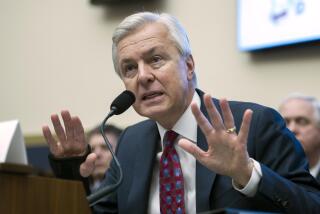Fannie Mae files painful restatement
- Share via
WASHINGTON — Fannie Mae erased $6.3 billion in profit in a long-awaited restatement Wednesday, capping an accounting scandal that stunned financial markets and brought the ouster of top executives and a record fine against the government-sponsored mortgage company.
The correction of its earnings from 2001 through June 30, 2004, ordered by the Securities and Exchange Commission two years ago, was well below Fannie Mae’s earlier estimate of $10.8 billion.
The accounting overhaul is costing the company about $1 billion this year to implement. It is the first earnings statement filed by Fannie Mae, which finances one of every five home loans in the U.S., since late 2004.
The scandal erupted in the fall of that year, when federal regulators accused Washington-based Fannie Mae -- with its political clout and gold-plated reputation -- of having serious accounting problems and manipulating earnings to meet Wall Street targets.
Fannie Mae on Wednesday also announced an increase in its quarterly dividend to 40 cents from 26 cents.
Its chief executive, Daniel Mudd, received a pay package of $13.1 million, including a $2.6-million bonus, for 2005, Fannie Mae disclosed in an SEC filing. Mudd, the top operations official at the time of the company’s accounting misdeeds, was elevated in a management shake-up in December 2004.
In May of this year, the federal agency that regulates Fannie Mae and Freddie Mac, its smaller sibling in the vast home mortgage market, issued a blistering report that alleged a six-year accounting fraud at Fannie Mae, the largest U.S. financial institution after Citigroup Inc.
The Office of Federal Housing Enterprise Oversight said the scheme included manipulation to reach earnings targets so company executives could pocket hundreds of millions of dollars in bonuses from 1998 to 2004.
Fannie Mae paid a record $400-million civil fine in a settlement with the housing oversight agency and the SEC.
Although the 2001-04 restatement marks a significant step, “they still have a way to go” to make the financial reports current, said Armando Falcon, who was the director of the housing oversight agency for six years until mid-2005. “If Freddie Mac is any indication, those two years won’t be easy,” he said.
Freddie Mac, which also is government-sponsored and has a publicly traded stock, had its own accounting scandal, which came to light in June 2003. The McLean, Va.-based mortgage company misstated earnings by about $5 billion -- mostly underreported -- from 2000 to 2002 to smooth out volatility in profit and uphold its steady image on Wall Street.
Over the last two years, Fannie Mae has disclosed a passel of accounting problems in several areas, including its core business of issuing securities backed by the billions of dollars of home mortgages it buys from lenders annually and bundles for resale to investors worldwide.
Other problems were revealed in loans, houses acquired through foreclosures, interest on delinquent home loans and reverse mortgages.
Fannie Mae’s former chief executive, Franklin Raines, who was White House budget director in the Clinton administration, was swept out of office in December 2004 along with then-Chief Financial Officer Timothy Howard.
More to Read
Inside the business of entertainment
The Wide Shot brings you news, analysis and insights on everything from streaming wars to production — and what it all means for the future.
You may occasionally receive promotional content from the Los Angeles Times.










